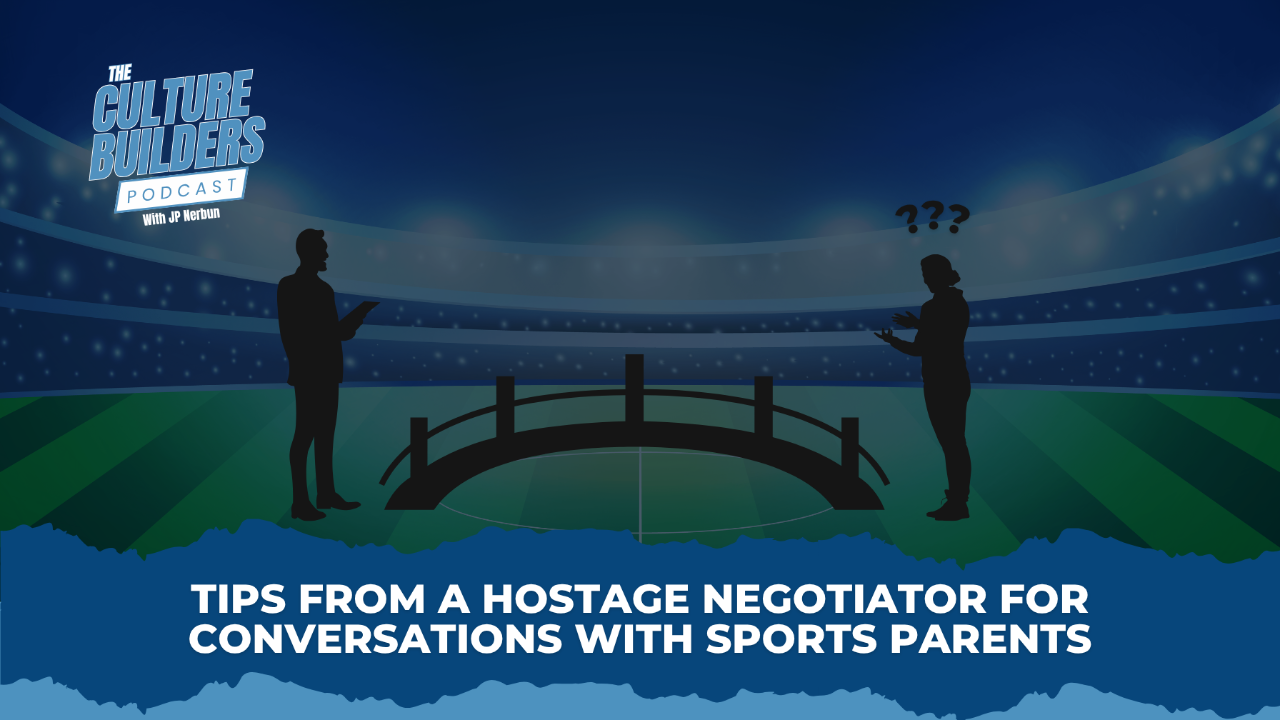Tips from a Hostage Negotiator for Conversations with Sports Parents

Adapted from The Coach's Guide to Sports Parents
In a previous article, I discussed the importance of having hard conversations with parents. But what are the keys to having them well? While each parent and situation are unique, I'd like to share a proven three-part framework for engaging in difficult discussions. My recommendation is that, because they are the focus of the discussion, the athlete should be part of these conversations.
Step 1: Actively Listen
When individuals feel truly heard, studies show they become more receptive, less defensive, and more open to new perspectives. Begin with genuine curiosity, focusing intently on the parent's words, expressions, and emotions. Detach from your own agenda.
Former FBI negotiator Chris Voss, author of Never Split the Difference, advises a mindset of discovery: "Your goal at the outset is to extract and observe as much information as possible." You're trying to understand not just their perspective, but why they think that way—the story they're telling themselves.
When you speak, ask curious "what" questions, not leading "why" questions. "Why" questions trigger defensiveness. "What" questions encourage exploration:
- "What would you like to discuss today that would be helpful for you and your child?"
- "What are you noticing?"
- "What’s so important about that to you?"
- "What reasons do you have for thinking and feeling that way?"
- "What would be a good outcome? A good solution?"
- "Tell me a little more about…"
If unsure, embrace silence or practice reflective listening. Paraphrase what you've heard, like “It sounds like…” or “What I think I’ve heard is…” Then ask, “Is there anything else I’m missing?” As Voss teaches, you’ll know they feel listened to when they respond with "That’s right," not "You’re right."
Listening deeply not only uncovers insights but helps parents become aware of what's truly at stake for them. Often, active listening alone completely resolves issues. As Philip Stanhope once said, “Many a man would rather you heard his story than grant his request.” Sometimes, parents even experience a breakthrough, like the mother who had an "aha" moment, exclaiming, “I’m so sorry, I just realized I’m turning into that crazy parent! This is for my son to learn to deal with.” Even without this realization, they'll be more receptive to the next phase.
Step 2: Share Your Perspective
Once the parent feels heard, thank them and ask permission to share your observations and reasoning: “If it’s all right, I’d like to share our perspective.”
Before sharing, consider Chris Voss’s “accusation audit.” Name potential criticisms the parent might harbor, owning them (to a degree) to disarm them:
- “I know I botched X…”
- “You might think that was bad coaching when Y happened…” Then, follow with your intention:
- “My intention was to…”
- “I did X, Y happened, and now here’s where we are…”
Lead this phase with conviction, without sugarcoating. Be candid about your decisions, using behavioral observations and evidence, not labels. If it’s about playing time, state plainly if their child isn't outperforming others. If it’s discipline, clarify the behavior and consequences. If it’s a development concern, explain if the child isn't taking responsibility for their own growth.
Connect back to previous conversations. For example, “I remember at the start of the season, you expressed concern for your daughter’s mental health. Giving her more playing time isn't the solution, as we both know she needs to develop better coping skills for life's adversities. This is an opportunity for growth.” Or for discipline: “He knows the team standards and consequences. He’ll continue to sit out if he chooses to complain to referees and criticize his teammates.
Step 3: Partner for Success
In this final step, clarify mutual actions. You might acknowledge areas where you could improve (e.g., communication, managing your composure), taking responsibility for those. In many cases, you’ll need to stand firm on your decisions.
Use inclusive language: “What’s the best way for us to move forward?” or “What can we both do to support your child?” As parents share their next steps, inquire about the support they need from you.
Parents may make requests that you are unwilling, unable, or believe are unhelpful to fulfill. At this point, establish boundaries: “I’m sorry, but that’s not something I am willing or able to do for you and your child.” Clearly verbalize whatever you are committed to doing to support the athlete.
Ultimately, the goal of the conversation is for the parent to feel heard, gain new insights, and establish a clear path forward where everyone understands their role in the athlete's success.
Do you want more ways to minimize parent issues and get them supporting you and the team? Get your copy of my book, The Coach’s Guide to Sports Parents, and check out The Working with Sports Parents Online Course.
Join Our Weekly Newsletter
The most practical insights on leadership and culture...
- 3 Minute Weekly Tools & Tips
- Notes to the Coaching Culture Podcast
- FREE Chapter of The Culture System
We hate SPAM. We will never sell your information, for any reason.


